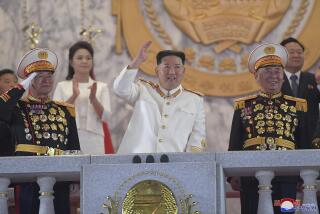Korea and the History of the Cold War : THE KOREAN WAR<i> by Max Hastings (Simon & Schuster: $22.95; 364 pp.) </i>
- Share via
In July 1953--after three bloody years--U.S. soldiers came home frustrated and confused from Korea. They returned from the first war that the United States had not won--from a war that set the stage for events in Vietnam a generation later.
For U.S. veterans of the Korean conflict, the war was a puzzlement. Some 33,629 Americans were killed by a “primitive” enemy with few advanced weapons. Soldiers were told they were fighting Soviet communism; yet, the battleground was a remote and insignificant country without Soviet soldiers.
Recently, the Korean War has been described as a war of “wrong perception.” Contrary to the views advanced by U.S. policy-makers at the time, there is little evidence that the Soviet Union ordered North Korea to attack the south in a wider scheme for global domination. Yet, U.S. leaders, preoccupied by ideological confrontation, were blinded to the forces of revolutionary nationalism occurring in the post-World War II period.
Max Hastings’ book is an important re-examination of the Korean conflict. A military historian, he researched American and British archival sources and interviewed 200 veterans--including Chinese veterans--to provide a vivid retelling of the war.
Using government documents, records of personal correspondence by government leaders, and oral-history transcript collections, he recounts the initial decision by U.S. leaders to intervene in Korea in 1950, to escalate the war into North Korea, and to deal with the question of Chinese intervention. At that point, he describes the policy options of U.S. leaders, including bombing of China and the use of the atomic bomb, and their ultimate decision to fight a “limited war.”
Hastings takes us to the battlefields: the plight of the 24th Division at Taejon, the heroic defense at the Pusan perimeter, MacArthur’s masterstroke at Inchon, the drive to the Yalu, and the infamous Chosin campaign. Finally, Hastings takes us to the negotiating table: the protracted, two-year truce talks.
Perhaps no other war so strongly divided and confused American civilian and military leaders. U.S. operations were hampered by the division of command between Truman and MacArthur and Gen. Walton H. Walker of the 8th Army and Gen. Ned Almond of 10th Corps. The morale of U.S. forces was affected further by Syngman Rhee, president of South Korea, and his intrigues with political rivals off the battlefield.
Hastings contends that the American effort was hindered by lack of determination and the Army’s technological and managerial approach to warfare. Also, there was a lack of coordination among U.N. troops, as revealed by a British captain’s remarks: “I felt very much an observer of an American show.” The war was largely salvaged by air superiority against enemy supply lines.
In retrospect, the Korean War represented a watershed in American history. Not only did it set the stage for the events in Vietnam, it also began the era of gigantic military spending, bleeding the national economy and extending U.S. involvement throughout the world.
Today, the Korean War is being reassessed--not only by military historians such as Max Hastings but by South Koreans as well. Many Koreans are asking a fundamental question: Would the country had been wracked by war had the United States and Soviet Union not divided Korea in 1945? This is a basic question that must be addressed by Americans also.
More to Read
Sign up for Essential California
The most important California stories and recommendations in your inbox every morning.
You may occasionally receive promotional content from the Los Angeles Times.













